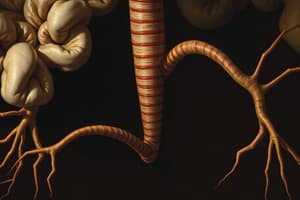Podcast
Questions and Answers
Where do endocrine glands secrete their products?
Where do endocrine glands secrete their products?
- Into the lumen of an organ
- Into the interstitial fluid surrounding the secreting cells (correct)
- To the outer surface of the body
- Into ducts that carry the secretions into body cavities
Which of the following is an exocrine gland product?
Which of the following is an exocrine gland product?
- Interstitial fluid
- Blood capillaries
- Hormones
- Sweat (correct)
Which of these is not an endocrine gland?
Which of these is not an endocrine gland?
- Thyroid gland
- Pancreas
- Sebaceous gland (correct)
- Pineal gland
What is a function of hormones?
What is a function of hormones?
What can synthetic hormones like RU486 do?
What can synthetic hormones like RU486 do?
What is the role of receptors in relation to hormones?
What is the role of receptors in relation to hormones?
What happens to target cells with receptors for specific hormones?
What happens to target cells with receptors for specific hormones?
Which part of the brain serves as a link between the nervous and endocrine systems?
Which part of the brain serves as a link between the nervous and endocrine systems?
What classifies the hypothalamus as an endocrine gland?
What classifies the hypothalamus as an endocrine gland?
What are the two main lobes of the pituitary gland?
What are the two main lobes of the pituitary gland?
What regulates the anterior pituitary gland?
What regulates the anterior pituitary gland?
What are some hormones secreted by the anterior pituitary gland?
What are some hormones secreted by the anterior pituitary gland?
Endocrine glands secrete their products into the interstitial fluid, while exocrine glands secrete their products into ducts
Endocrine glands secrete their products into the interstitial fluid, while exocrine glands secrete their products into ducts
The pituitary gland is considered an exocrine gland
The pituitary gland is considered an exocrine gland
The hypothalamus contains cells that secrete hormones and is therefore classified as an endocrine gland
The hypothalamus contains cells that secrete hormones and is therefore classified as an endocrine gland
The pancreas functions exclusively as an endocrine gland
The pancreas functions exclusively as an endocrine gland
Synthetic hormones like RU486 can enhance the function of natural hormone receptors
Synthetic hormones like RU486 can enhance the function of natural hormone receptors
Excessive hormones can never deactivate receptors
Excessive hormones can never deactivate receptors
The presence of hormones can activate target cells with receptors for those hormones
The presence of hormones can activate target cells with receptors for those hormones
The hypothalamus is not classified as an endocrine gland
The hypothalamus is not classified as an endocrine gland
The anterior pituitary gland does not control a wide range of bodily activities
The anterior pituitary gland does not control a wide range of bodily activities
The anterior pituitary gland secretes hormones like hGH, TSH, FSH, PRL, and ACTH
The anterior pituitary gland secretes hormones like hGH, TSH, FSH, PRL, and ACTH
All cells in the anterior pituitary gland react to chemical staining in the same way
All cells in the anterior pituitary gland react to chemical staining in the same way
The anterior pituitary gland does not secrete tropic hormones
The anterior pituitary gland does not secrete tropic hormones
The pituitary gland does not secrete tropic hormones like TSH, ACTH, FSH, and LH, which regulate the ovaries and testes
The pituitary gland does not secrete tropic hormones like TSH, ACTH, FSH, and LH, which regulate the ovaries and testes
The pituitary gland does not play a crucial role in regulating growth, reproduction, metabolism, and homeostasis
The pituitary gland does not play a crucial role in regulating growth, reproduction, metabolism, and homeostasis
The hypothalamus does not serve as a link between the nervous and endocrine systems
The hypothalamus does not serve as a link between the nervous and endocrine systems
The posterior pituitary gland does not have distinct functions from the anterior lobe
The posterior pituitary gland does not have distinct functions from the anterior lobe
Tengdu eiginleika innkirtlakerfisins við þau líffæri sem það inniheldur:
Tengdu eiginleika innkirtlakerfisins við þau líffæri sem það inniheldur:
Tengdu svipuðu líffæri við rétta gerð kirtla:
Tengdu svipuðu líffæri við rétta gerð kirtla:
Tengdu eftirfarandi kirtla með þeirri aðalverkun sem þeir hafa:
Tengdu eftirfarandi kirtla með þeirri aðalverkun sem þeir hafa:
Tengdu eftirfarandi hormón með þeim aðalverkunum sem þau hafa í líkamanum:
Tengdu eftirfarandi hormón með þeim aðalverkunum sem þau hafa í líkamanum:
Tengdu eftirfarandi staðreyndir um hormón við réttu svari:
Tengdu eftirfarandi staðreyndir um hormón við réttu svari:
Flashcards are hidden until you start studying
Study Notes
Endocrine System and Hormones
- Synthetic hormones like RU486 can block natural hormone receptors, affecting normal functions
- Hormones need receptors to perform their functions; excessive hormones can deactivate receptors
- Target cells with receptors for specific hormones are activated when the hormone is present
- The hypothalamus serves as a link between the nervous and endocrine systems
- The hypothalamus regulates various bodily functions and is also classified as an endocrine gland
- The pituitary gland consists of the anterior and posterior lobes, each with distinct functions
- The anterior pituitary gland controls a wide range of bodily activities and is regulated by the hypothalamus
- Hormones secreted by the anterior pituitary gland include hGH, TSH, FSH, PRL, and ACTH
- Different types of cells in the anterior pituitary gland react to chemical staining in different ways
- The anterior pituitary gland secretes tropic hormones, which regulate the function of other endocrine glands
- The pituitary gland secretes tropic hormones like TSH, ACTH, FSH, and LH, which regulate the ovaries and testes
- The pituitary gland plays a crucial role in regulating growth, reproduction, metabolism, and homeostasis
Endocrine System and Hormones
- Synthetic hormones like RU486 can block natural hormone receptors, affecting normal functions
- Hormones need receptors to perform their functions; excessive hormones can deactivate receptors
- Target cells with receptors for specific hormones are activated when the hormone is present
- The hypothalamus serves as a link between the nervous and endocrine systems
- The hypothalamus regulates various bodily functions and is also classified as an endocrine gland
- The pituitary gland consists of the anterior and posterior lobes, each with distinct functions
- The anterior pituitary gland controls a wide range of bodily activities and is regulated by the hypothalamus
- Hormones secreted by the anterior pituitary gland include hGH, TSH, FSH, PRL, and ACTH
- Different types of cells in the anterior pituitary gland react to chemical staining in different ways
- The anterior pituitary gland secretes tropic hormones, which regulate the function of other endocrine glands
- The pituitary gland secretes tropic hormones like TSH, ACTH, FSH, and LH, which regulate the ovaries and testes
- The pituitary gland plays a crucial role in regulating growth, reproduction, metabolism, and homeostasis
The Endocrine System: Key Concepts and Functions
- Synthetic hormones like RU486 (mifepristone) can block the receptors for naturally occurring hormones, such as progesterone, and prevent their normal effects, as seen in abortion induction.
- Hormones exert their effects by interacting with specific receptors on target cells, with each cell typically having 2000 to 100,000 receptors for a specific hormone.
- The hypothalamus, classified as an endocrine gland, serves as a vital link between the nervous and endocrine systems, controlling various bodily functions and receiving signals from internal organs and the retina.
- The pituitary gland, comprising the anterior and posterior lobes, plays a crucial role in regulating numerous bodily activities, from growth to reproduction.
- The anterior pituitary, representing 75% of the gland, releases hormones that control various bodily functions, and its secretion is regulated by the hypothalamus through the hypothalamic-hypophyseal portal system.
- Hormones released by the anterior pituitary include human growth hormone (hGH), thyroid-stimulating hormone (TSH), follicle-stimulating hormone (FSH), and prolactin, each with specific functions in the body.
- The anterior pituitary consists of five types of cells: somatotrophs, thyrotrophs, gonadotrophs, lactotrophs, and corticotrophs, which can be grouped based on their reaction to chemical staining.
- The anterior pituitary releases tropic hormones, including TSH, ACTH, FSH, and LH, which regulate the function of other endocrine glands such as the thyroid, adrenal cortex, and gonads.
- The thymus, pancreas, pituitary, testes, and ovaries are exclusively endocrine glands, while the placenta, kidney, sudoriferous glands, and mucous glands have other primary functions.
- Hormones have a significant impact even in small doses, acting only on cells with specific receptors for the hormone, and the number of receptors on a cell can adjust based on the hormone's concentration.
- The hypothalamus, functioning as the "boss" of the pituitary gland, controls the release of hormones from the pituitary and is crucial in coordinating various bodily functions.
- The pituitary gland, located in the sella turcica of the sphenoid bone, is connected to the hypothalamus and consists of distinct functional and anatomical divisions, the anterior and posterior lobes.
Studying That Suits You
Use AI to generate personalized quizzes and flashcards to suit your learning preferences.




